| | | | | | | Presented By Equitybee | | | | Axios World | | By Dave Lawler · Nov 28, 2022 | | Welcome back to Axios World. - Tonight's edition (1,960 words, 7½ minutes) starts with China's dramatic protests, looks at some stunning political comebacks, and ends with a look at where things stand in the World Cup ahead of tomorrow's big U.S.-Iran match.
New arrival? Subscribe. | | | | | | 1 big thing: Blank paper becomes global symbol of resistance | 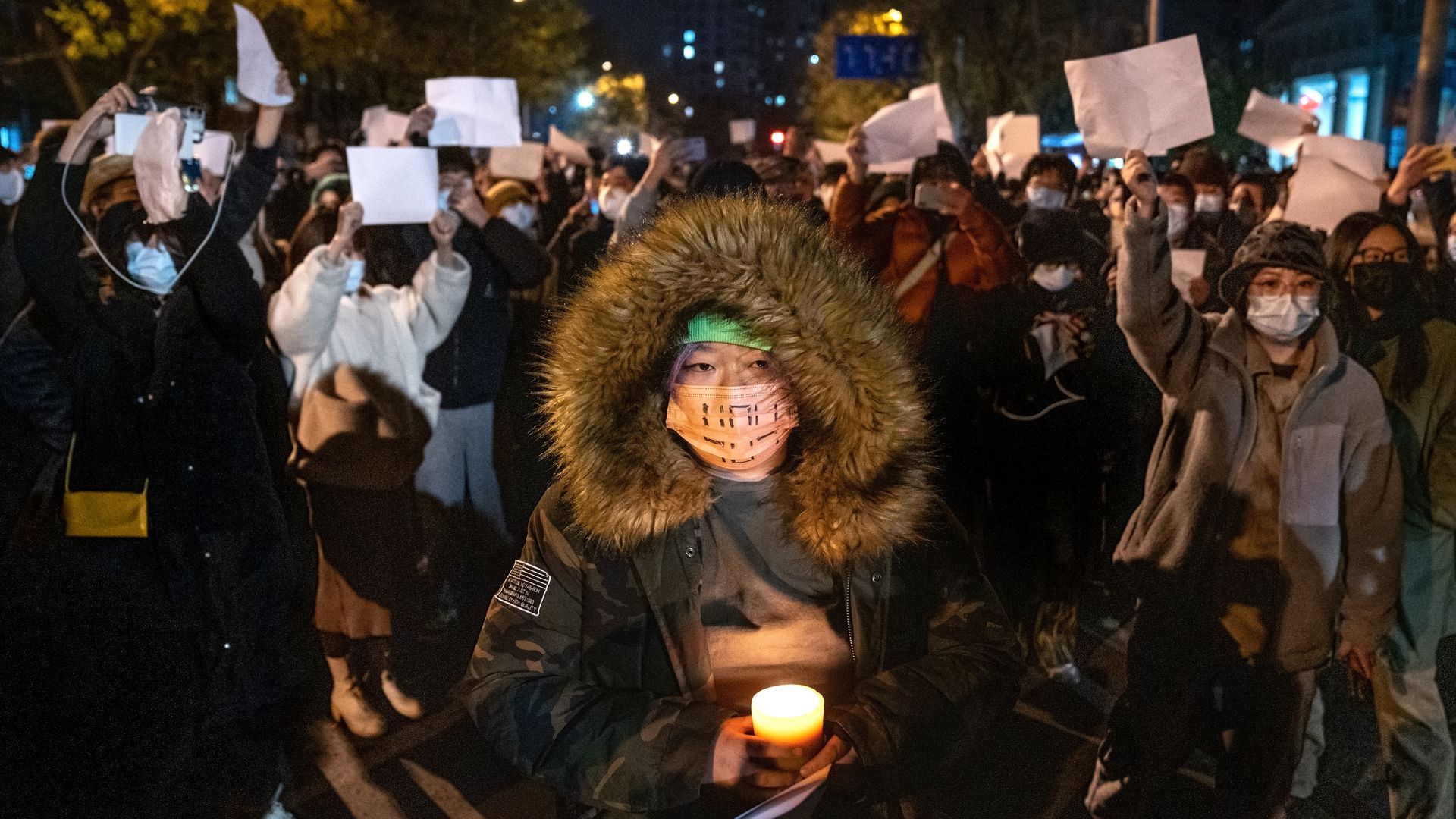 | | | Protesters hold blank pieces of paper in Beijing on Sunday. Photo: Bloomberg via Getty Images | | | | People protesting harsh COVID-19 restrictions in China have held aloft the most innocuous of objects: a blank sheet of paper, Axios' Han Chen and I report. The big picture: Blank signs were previously displayed during the Hong Kong protests in 2020 and the demonstrations in Russia earlier this year against the invasion of Ukraine. As one protester in Beijing told Reuters, "The white paper represents everything we want to say but cannot say." "Although it came out of an anti-zero-COVID movement, this behavior also expresses a longing for freedom of speech. These blank papers simply mean 'I want to speak out.'" — Badiucao, a prominent dissident Chinese artist living in exile in Australia, to Axios Driving the news: Over the weekend, images and videos of students at prestigious universities in Beijing and Nanjing protesting with blank pieces of paper spread widely online. - Blank sheets of paper were also seen Sunday at a vigil in Shanghai for the victims of a fire in Xinjiang. The fire sparked the protests due to claims, denied by authorities, that COVID lockdown measures impeded the emergency response.
- The blank paper has quickly become a symbol of the protests. Results for "blank sheet of paper" and "white paper" have been censored on the Chinese internet, according to the BBC.
- "I think the white paper is itself a form of protest about the lack of freedom of expression in China," says Maya Wang, senior China researcher at Human Rights Watch. When any protest message could get you in trouble, "displaying sheets of white paper is kind of like the ultimate protest against this fear."
Flashback: Protesters in Hong Kong turned to blank signs after a national security law imposed from Beijing meant displaying pro-democracy slogans could be deemed an act of sedition or terrorism. - One 16-year-old who took part in one such protest at a Hong Kong shopping mall told AFP that while their signs were blank, they still carried a message, as "people's minds are not blank."
- While the Hong Kong demonstrators brought the tactic to international attention, an activist and blogger named Aslan Sagutdinov had filmed himself holding a blank sign in the city of Uralsk, Kazakhstan, a year earlier, in 2019.
- Sagutdinov correctly predicted he'd be arrested, saying: "I want to show that the idiocy in our country has gotten so strong that the police will detain me now even though there are no inscriptions, no slogans, without my chanting or saying anything."
After the invasion of Ukraine, there were also scattered incidents in Russia of individuals being detained after standing in public squares with blank signs — or, in one instance, miming that they were holding "invisible" signs. - Others held signs showing only asterisks after the Kremlin made it illegal to call the war a "war," rather than "special military operation."
- Several free speech protesters in the U.K. also adopted the blank sign tactic this year after several individuals were arrested or escorted away by police for holding anti-monarchy signs during events marking the death of Queen Elizabeth II.
What to watch: In China, where public dissent is often quickly suppressed, protesters standing in silence with blank signs pose a more subtle challenge to the authorities. - Police stopped people walking near the sites of the weekend's protests today, in some cases searching their phones, Reuters reports. There have been no mass arrests as yet, and state media has remained silent on the protests.
|     | | | | | | 2. Beijing sticking with "zero Covid" for now | 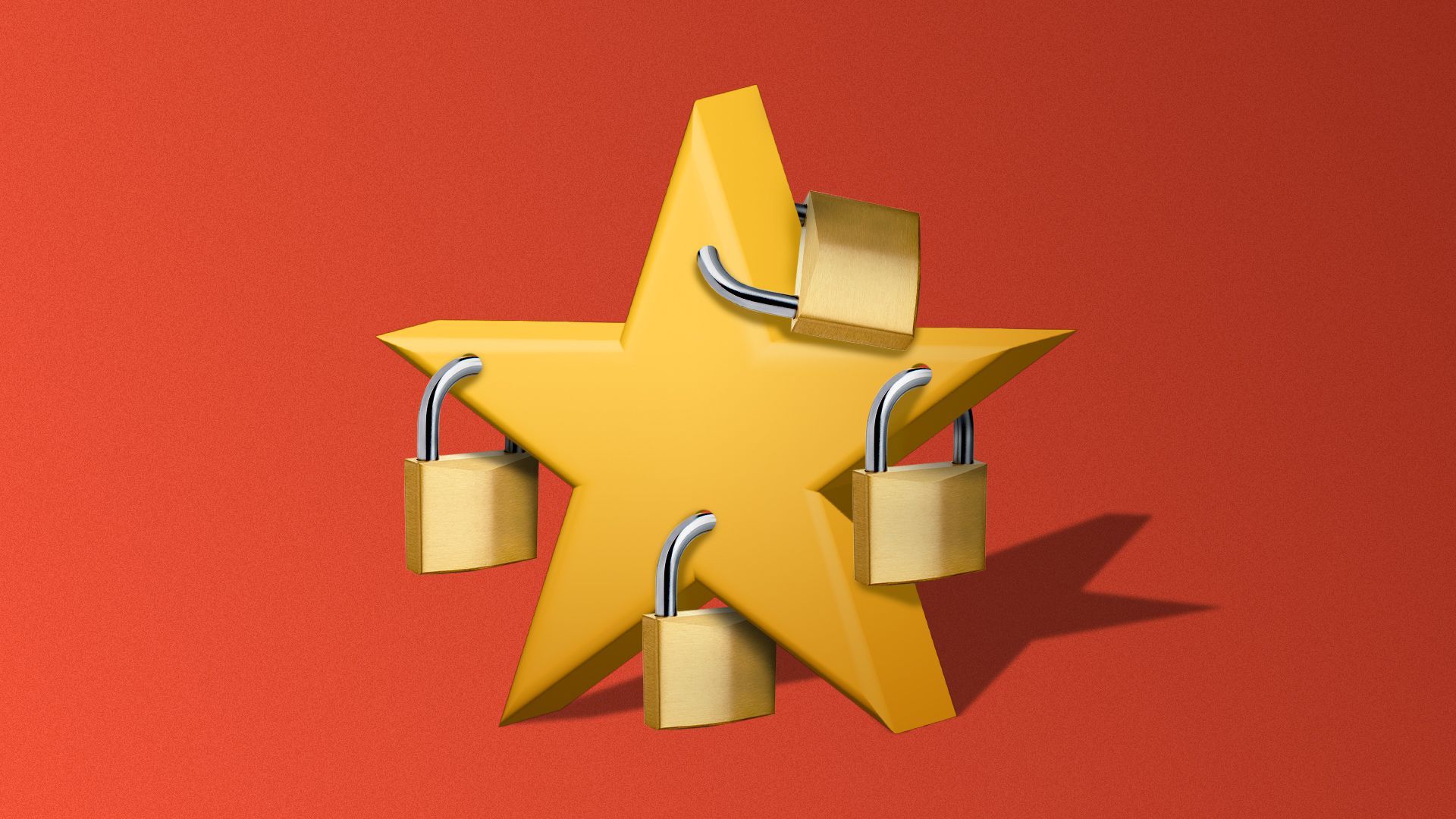 | | | Illustration: Aïda Amer/Axios | | | | The early signs out of Beijing are that the government is sticking with the zero-COVID policies that have rocked the economy and deeply damaged people's trust, Axios' Bethany Allen-Ebrahimian reports. Why it matters: Skyrocketing COVID cases mean President Xi Jinping will likely have to choose between plunging his country back into the draconian lockdowns or abandoning his signature pandemic policy. State of play: Chinese state media continued to praise zero-COVID measures today, signaling no change in official policy. - However, authorities in several cities announced the easing of some public health restrictions. In Beijing, city officials said they would no longer erect gates to cordon off access to apartment blocks where COVID cases had been detected, AP reported.
- International companies are closely watching for any signs of a broader policy change, my colleagues report in Axios Closer.
Meanwhile, Chinese state TV appears to be censoring images of maskless crowds at the World Cup to avoid an unwelcome contrast with the restrictions in China. |     | | | | | | 3. Political comebacks: A new Chiang in Taipei | 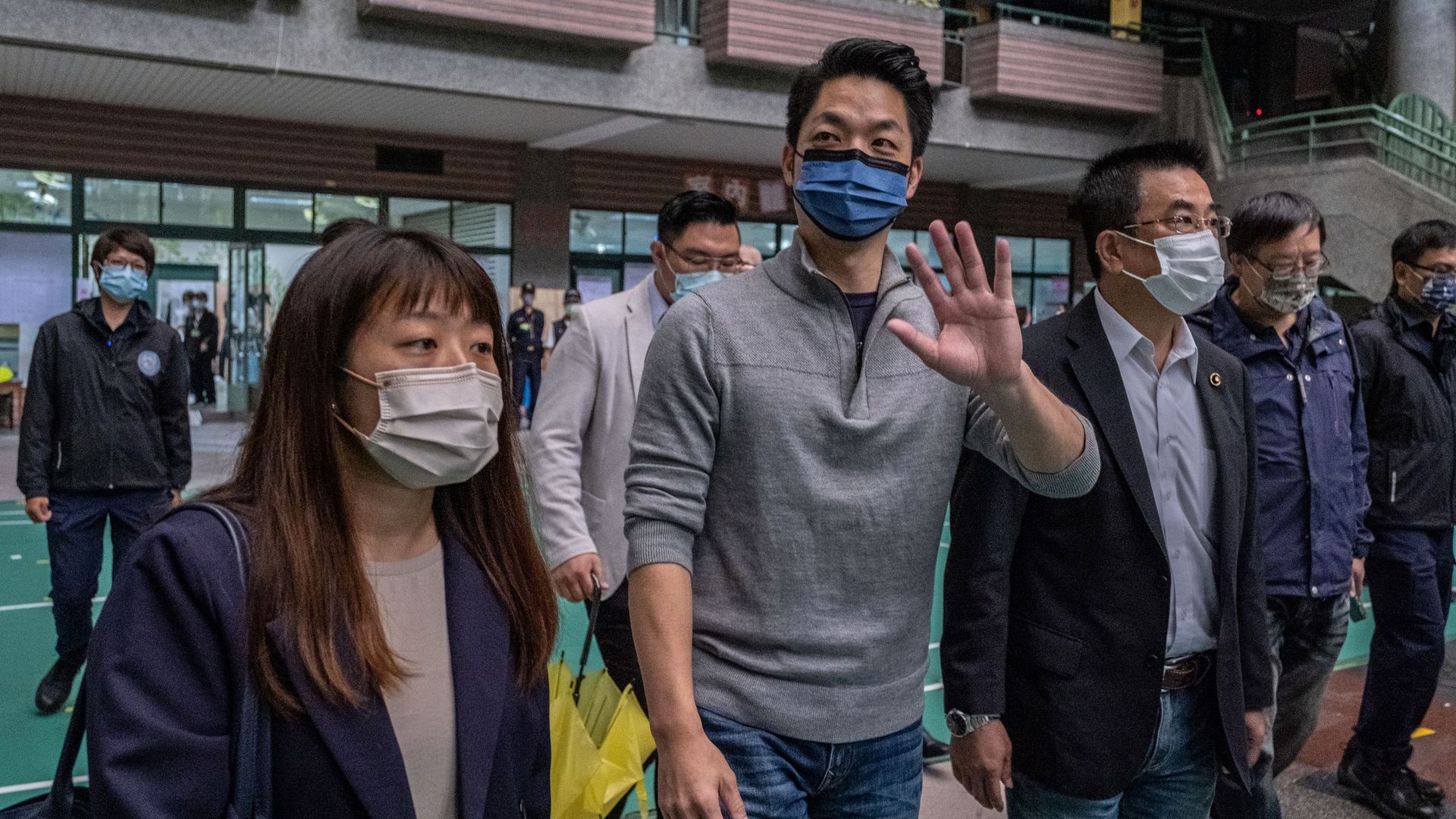 | | | Wayne Chiang casts his ballot in Taipei. Photo: Lam Yik Fei/Bloomberg via Getty Images | | | | 1. Seven decades after Chiang Kai-shek retreated across the Taiwan Strait to Taipei, the former dictator's grandson was elected Saturday as mayor of the Taiwanese capital. The big picture: That was the biggest in a series of local election wins for the Kuomintang (KMT), which was the only legal party in Chiang Kai-shek's day but has more recently floundered in opposition to the tough-on-China Democratic Progressive Party (DPP). - President Tsai Ing-wen stepped down as DPP chair after Saturday's setbacks, which analysts attributed more to pandemic fatigue and economic concerns than to the China issue, on which the KMT lacks a coherent position.
- Wayne Chiang, the new mayor, was a corporate lawyer in the U.S. before returning to Taiwan and entering politics.
2. Meanwhile in Malaysia, Anwar Ibrahim has completed a remarkable journey from heir apparent (twice), to political prisoner (twice), to opposition leader and now to prime minister. Flashback: Anwar served as finance minister to Mahathir Mohamad from 1991 to 1998 and was once expected to succeed him, but the two fell out and Anwar was jailed on sodomy charges that were widely seen as politically motivated. - During a second stint in prison on the same charge, he joined forces with his former nemesis Mahathir to win the 2018 election from a jail cell. But he was again denied the top job when their pact broke down.
- He was finally sworn in on Thursday after his reformist, multi-ethnic coalition finished first in last week's election.
- Yes, but: They didn't win a majority, meaning Anwar had to strike a deal with rivals in the former ruling party to form a unity government. That balancing act may be tough to sustain.
3. Former Pakistani Prime Minister Imran Khan addressed a rally Saturday for the first time since being shot this month, vowing to fight on "until my last drop of blood." Driving the news: Khan has used mass gatherings to pressure the government to hold early elections, which his party would stand a strong chance of winning. - But he avoided a likely clash with security forces by calling off a planned march to Islamabad, the capital. He continues to accuse military leaders of conspiring to oust him and his successor, Shehbaz Sharif, of seeking his assassination (Sharif denies that, and Khan has provided no evidence).
- Meanwhile, Lt. Gen. Asim Munir was named on Thursday as army chief — often described as the most powerful post in Pakistan. That was seen as a setback for Khan, as he previously removed Munir as head of Pakistani intelligence.
4. With a month left before Luiz Inácio Lula da Silva caps off his remarkable comeback by being inaugurated once again as Brazil's president, supporters of outgoing leader Jair Bolsonaro are stepping up their protests. - State of play: Bolsonaro has largely stayed silent since narrowly losing to Lula, but he has not accepted the results.
|     | | | | | | A message from Equitybee | | Access high-growth startups at past valuations | | | 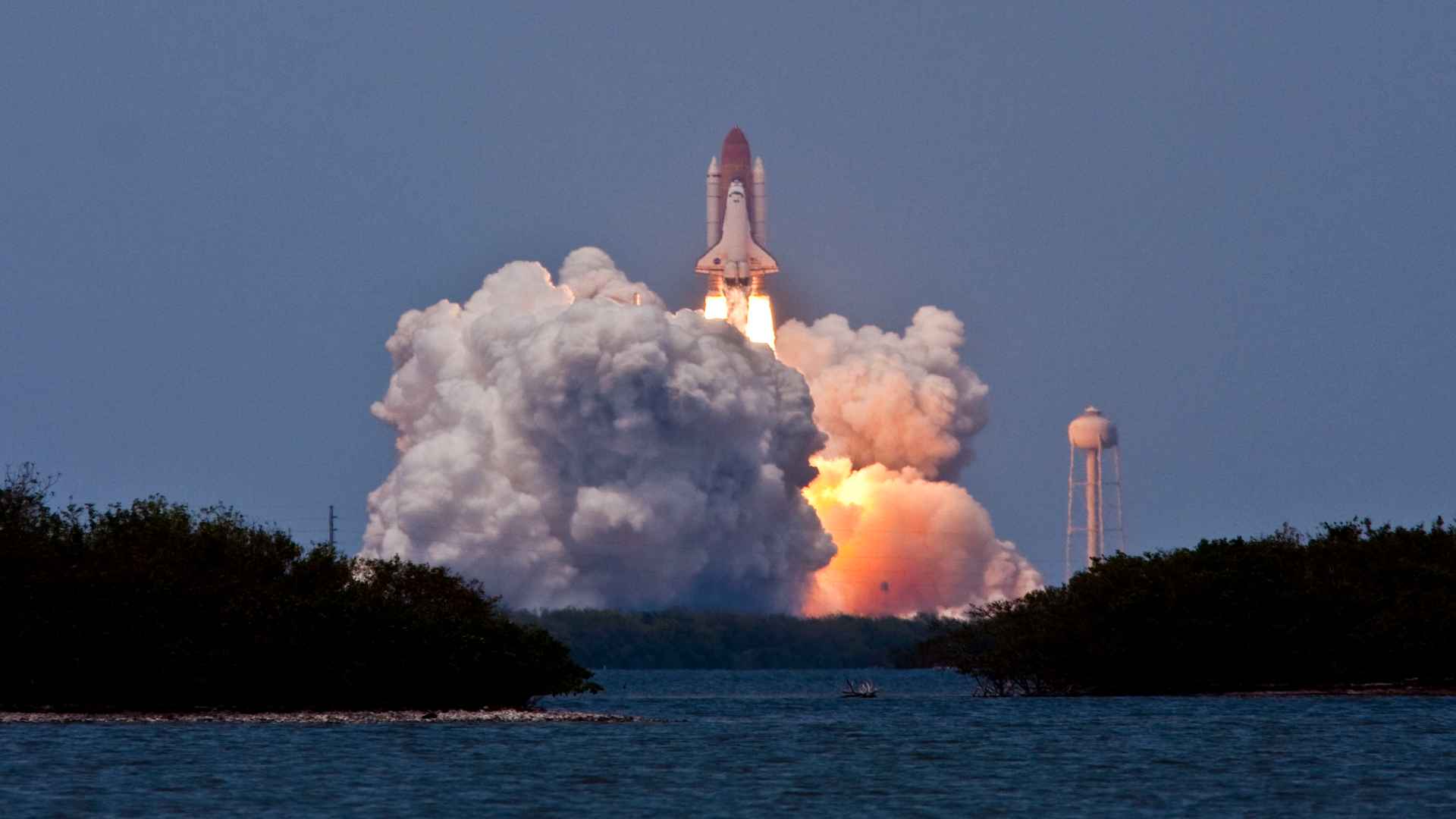 | | | | Equitybee allows you to access high-growth, VC-backed startups at past valuations by funding employee stock options. Get involved! Investments are speculative, illiquid, contain risk of 100% loss; do not grant ownership of stock. Securities offered by EquityBee Securities, member FINRA. | | | | | | Bonus: Where in the world? | 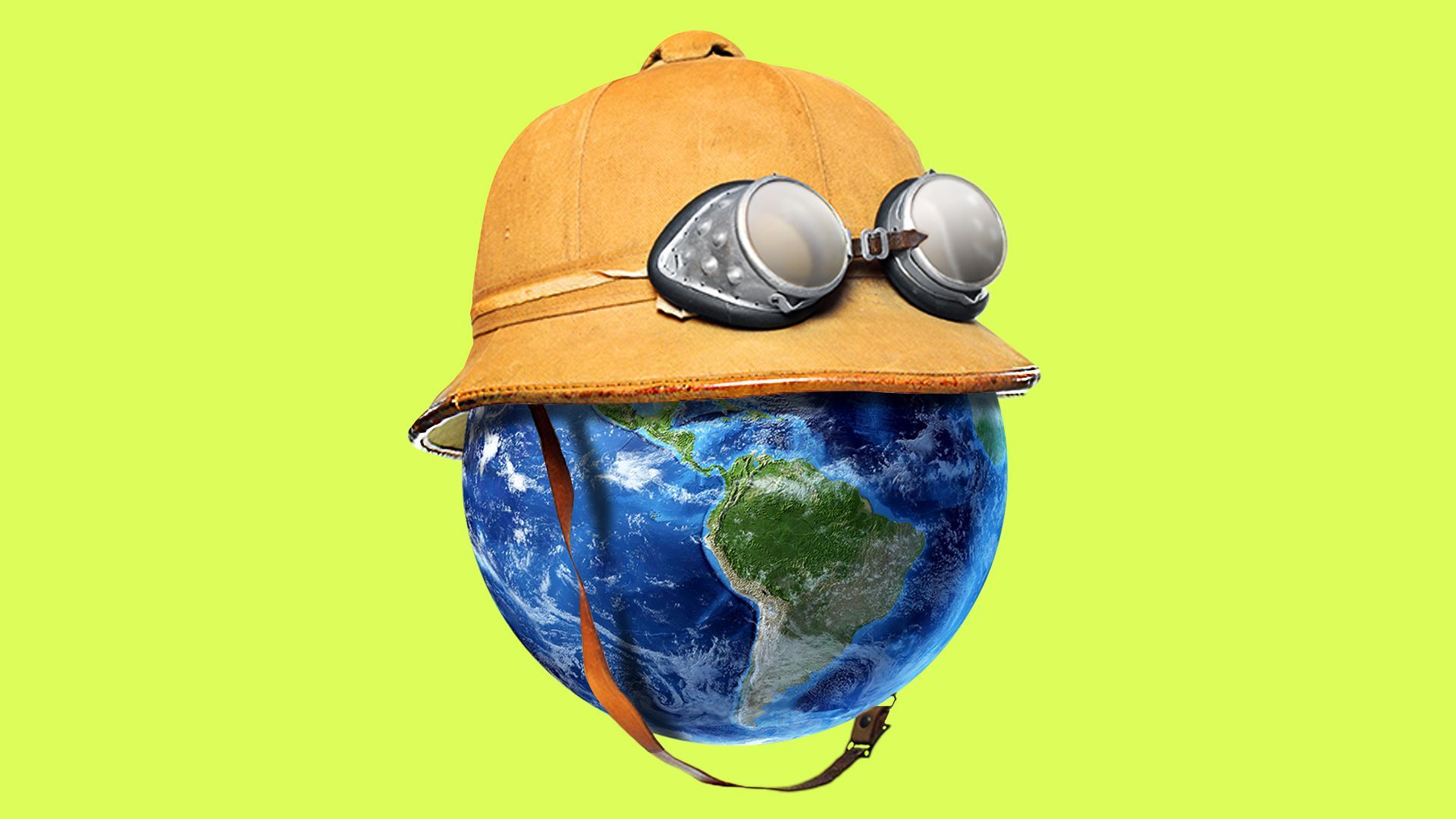 | | | Illustration: Natalie Peeples/Axios | | | | Turkey is now Türkiye, at least officially, but international adoption of that spelling and pronunciation has been mixed, the WSJ notes (Axios style remains "Turkey"). Here are the old names of a few more countries that have officially rebranded. Can you provide the current name? 1. Macedonia 2. Burma 3. Swaziland 4. Western Samoa 5. Ceylon 6. Kampuchea 7. Tanganyika 8. Zaire 9. Persia 10. Siam Scroll to bottom for answers |     | | | | | | 4. Kurdish commander: Biden has "moral duty" to stop Turkey | 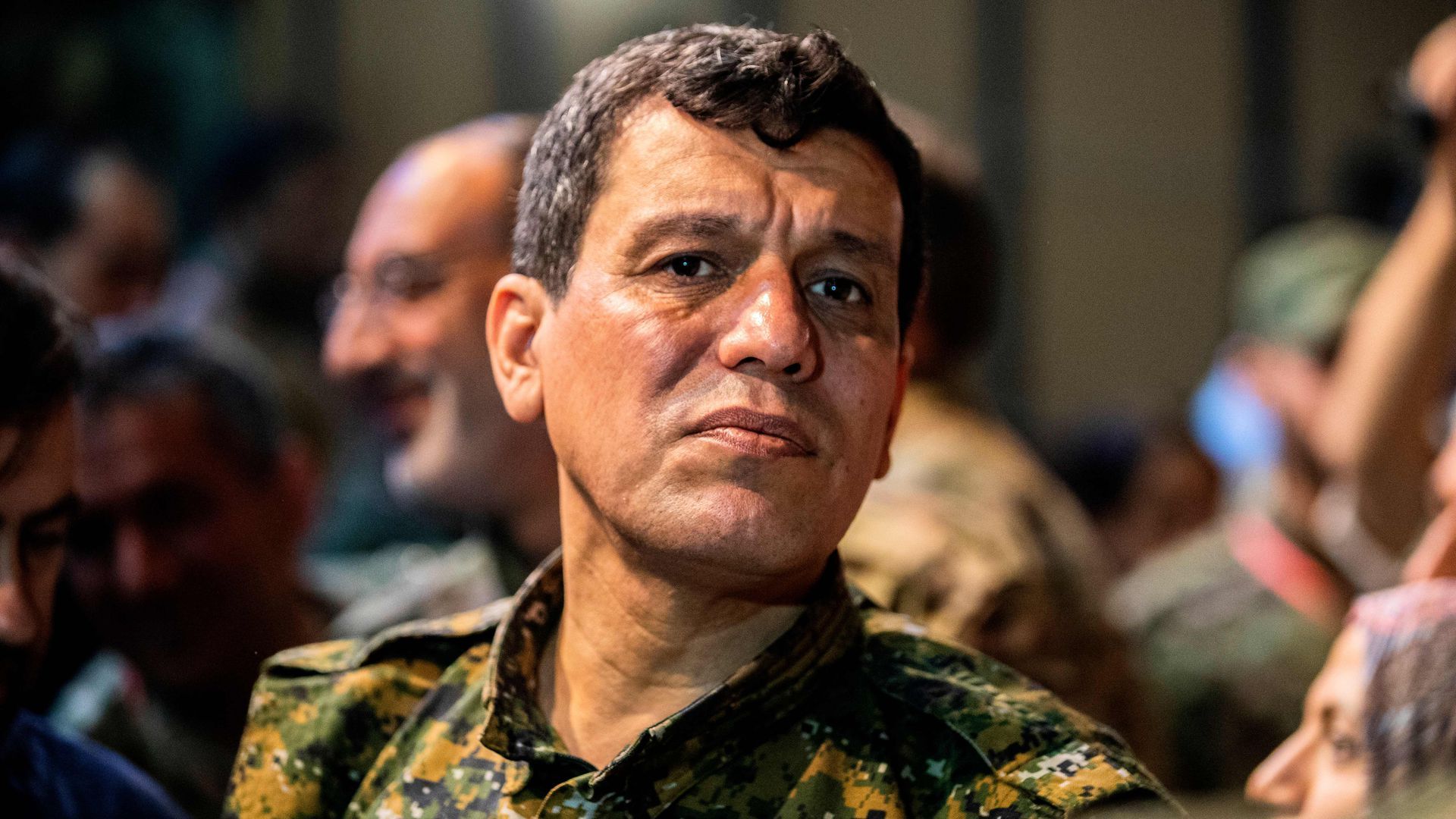 | | | SDF Commander Gen. Mazloum Kobani Abdi. Photo: Delil Soulieman/AFP via Getty Images | | | | Turkey is nearly ready to mount a ground offensive against Kurdish forces in northern Syria, and a decision to proceed could come imminently, Turkish officials tell Reuters. The commander of the U.S.-backed Syrian Democratic Forces (SDF) told Axios in an interview last Wednesday that President Biden has a "moral duty" to convince Turkish President Erdoğan to back off. The big picture: The SDF was the most effective U.S. partner in combating ISIS in Syria, but Erdoğan considers the militia an enemy and blames Kurdish groups for a Nov. 13 terror attack in Istanbul. The SDF denies any role. - The Kurdish commander, Gen. Mazloum Kobani Abdi, also met Russia's commander in Syria today, per AP.
- With Turkey continuing to conduct air and drone strikes on SDF targets in Syria ahead of a potential ground operation, both Moscow and Washington are calling for de-escalation.
- Flashback: Turkey conducted a major ground offensive against the SDF in 2019 and has threatened incursions multiple times since without following through.
In the interview, Mazloum said Turkey's strategy has been to announce an operation, conduct some preparations, then test the reactions of the U.S. and Russia. - "I believe once they [Turkey] see there is no strong opposition from the main players, they will go ahead," the general said. "We believe the reactions are not enough yet to stop the Turks from launching this operation."
- Mazloum added that after the SDF's heavy losses against ISIS, with more than 12,000 soldiers killed, "we believe, and our people do the same, that the U.S. and others have a moral duty to defend the families of these martyrs and the people of this region."
Read the interview |     | | | | | | 5. U.S. eases Venezuela sanctions as rivals meet |  Data: EIA; Chart: Will Chase/Axios Venezuela's government and opposition agreed during talks in Mexico City to request billions of dollars held overseas be unfrozen and used for humanitarian aid. - Both sides said they would keep negotiating toward a solution to the country's political crisis. Previous talks have collapsed.
- The Biden administration welcomed the ongoing dialogue and announced it would ease sanctions to allow Chevron to resume pumping oil from Venezuelan oil fields.
More global headlines: - The government of Sao Tome and Principe claimed to have thwarted a coup Thursday in the West African island nation.
- The world's longest-serving non-royal leader, Equatorial Guinea President Teodoro Obiang Nguema Mbasogo, "won" a sixth term in uncompetitive elections.
- Nepal's ruling party is ahead but short of a majority with most results in from the country's election, which was seen as a potential hinge moment for relations with regional superpowers China and India.
|     | | | | | | 6. Coming attractions: World Cup matches; Macron's visit |  Data: Fox Sports; Table: Axios Visuals Brazil and Portugal joined France today as the only teams to have advanced to the knockout rounds of the World Cup. - The third set of games begins tomorrow and includes decisive matches between the U.S. and Iran and Ecuador and Senegal— with the winners in both guaranteed a spot in the last 16.
Meanwhile, French President Emmanuel Macron will arrive tomorrow for the first state visit of President Biden's tenure. The state dinner is on Thursday. - A senior French official briefed reporters today that the invitation underscores the "incredibly strong" state of relations — quite a turnaround one year after the AUKUS agreement left French officials fuming.
|     | | | | | | 7. Stories we're watching | 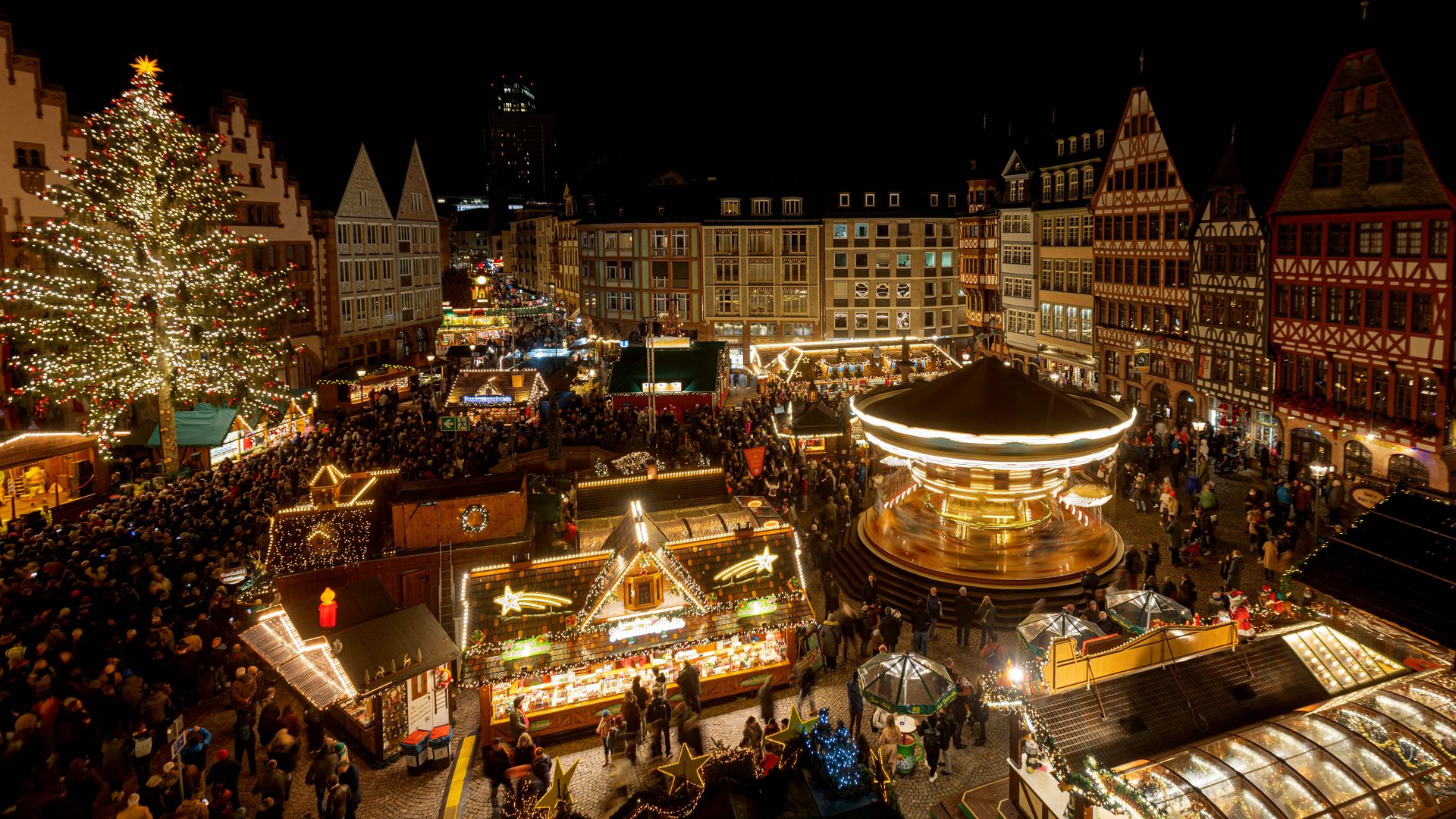 | | | It's Christmas market season in Frankfurt, Germany. Photo: Andrew Pain/AFP via Getty Images | | | - Brazil court fines Bolsonaro allies for "bad faith" election challenge
- U.S. bans Huawei gear
- Niece of Iran's supreme leader calls for countries to cut ties
- UN probes violence against Iran protesters
- Trudeau defends use of emergency powers to quell trucker protests
- Kim Jong-Un's daughter makes second public appearance
- Ukraine marks 9 months of war
Quoted: "She was fascinated by the travails of Boris Johnson and Liz Truss, and horrified at [Vladimir] Putin and the state of the world. But she was confident that she would be back." — Sean Turnell, an adviser to ousted Myanmar leader Aung San Suu Kyi, to the FT after visiting her at the concrete hut in a jungle clearing where she is being held. |     | | | | | | A message from Equitybee | | Invest in high-growth, VC-backed startups | | |  | | | | With Equitybee, you can get access to investment opportunities by funding employee stock options. Join the accredited investor network. Investments are speculative, illiquid, contain risk of 100% loss; do not grant ownership of stock. Securities offered by EquityBee Securities, member FINRA. | | | | Answers: 1. North Macedonia; 2. Myanmar; 3. Eswatini; 4. Samoa; 5. Sri Lanka; 6. Cambodia; 7. Tanzania; 8. Democratic Republic of Congo; 9. Iran; 10. Thailand Key: 1. Macedonia; 2. Burma; 3. Swaziland; 4. Western Samoa; 5. Ceylon; 6. Kampuchea; 7. Tanganyika; 8. Zaire; 9. Persia; 10. Siam |  | | Are you a fan of this email format? Your essential communications — to staff, clients and other stakeholders — can have the same style. Axios HQ, a powerful platform, will help you do it. | | | | | | Axios thanks our partners for supporting our newsletters. If you're interested in advertising, learn more here.
Sponsorship has no influence on editorial content. Axios, 3100 Clarendon Blvd, Arlington VA 22201 | | | You received this email because you signed up for newsletters from Axios.
Change your preferences or unsubscribe here. | | | Was this email forwarded to you?
Sign up now to get Axios in your inbox. | | | | Follow Axios on social media:    | | | | | |













No comments:
Post a Comment